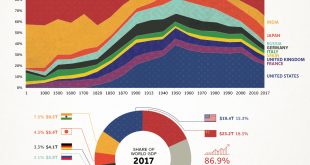You'll want to read the whole post. It's short. Visual Capitalist2,000 Years of Economic History in One ChartJeff Desjardins
Read More »C. P. Chandrasekhar — The Indian Economy: 70 years after Independence
It would be interesting to compare India's development with that of China over this period, which is roughly equivalent to China's period of modernization. Arguably, China's rise under communism began in a worse position that India's at the end of the British Raj. Is there is a lesson about socio-economic systems to be gleaned from such a comparison? And political economy.Real-World Economics Review BlogThe Indian Economy: 70 years after Independence C. P. Chandrasekhar | Professor at the...
Read More »Lord Keynes — Larry White on the Origins of Coined Money: A Critique
The latest iteration in the controversy over theory of money, money creation, and historical origins of money use.Social Democracy For The 21St Century: A Post Keynesian PerspectiveLarry White on the Origins of Coined Money: A CritiqueLord Keynes
Read More »A theory of economic policy and the role of institutions
Nicola Acocella published a paper in the Journal of Economic Surveys (a free, preliminary version is available here) a paper on the development of the theory of economic policy. Acocella is clearly fully aware of the differences between classical political economics and marginalism (neoclassical economics). And he dismisses the pre-margnialist views on economic policy as being unsystematic and devoid of general principles. In his words: Most classical writers and the marginalists had...
Read More »The neoliberal road to autocracy – a response to criticism
In an article “The neoliberal road to autocracy”, published in April 2017 on the website of International Politics and Society, I wrote this:“Of all these promises, the one that globalisation’s advocates proclaim most strongly is the fall in poverty worldwide. But in fact the decline in absolute poverty is part of a longer trend that has been traced from 1820, according to World Bank data. And much of that fall is not due to open, global markets, but to scientific and...
Read More »10 years after: Neoliberalism – the Break-Up Tour
To understand why neoliberalism is in crisis, it helps to begin at the beginning with Adam Smith. He was the grandfather of market economics, but a more complex thinker than modern day neoliberals like to remember. They hail the ‘invisible hand’ – the idea that self-interest and unmanaged markets work best – and recall his...
Read More »Brookings dance to Trump’s tune on US government interest payments
I was looking at my Tweetdeck this morning when I came across this tweet from the Brookings Institution: Now it is clearly a Good Thing in principle for the US Federal government’s budget to be explained in clear and simple ways, but why – I asked myself – do Brookings choose to concentrate today on interest payments (which form just 6% of outlays)...
Read More »Back of the envelope calculation: BNDES lending and the Marshall Plan
So, a few days ago, someone (my bad, can't remember who did it) posted on FB a piece (in Portuguese and behind a wall; but this post is mostly about the role of historical comparisons really, so you can skip the piece altogether) on the Brazilian National Development Bank (Portuguese acronym is BNDES, btw) and how it lend more than the US government with the Marshall Plan. The guy did a back of the envelope calculation (I did check and bringing the US$ 13 billion to present value, with the...
Read More »Ten things to know about social assistance in Canada
I’ve just written a blog post about social assistance in Canada. Points raised in the blog post include the following: -Social assistance has two contradictory objectives: 1) to give people enough money to live on; and 2) to not give people enough money to live on. -Very few immigrants receive social assistance (relative to the general population). -Several Canadian provinces have seen a rise in persons with disabilities receiving social assistance. -The inadequacy in social assistance...
Read More »The introduction and evolution of child benefits in Canada
Allan Moscovitch and I have co-authored a blog post that looks at the history of child benefits in Canada. Points made in the blog post include the following: -Child benefits can reduce both poverty and homelessness. -When child benefits began in Canada after World War II, one major motivating factor for the federal government was to avoid recession. Another was to fend off social unrest (i.e. Canada’s growing labour movement and the growing popularity of the CCF). The full blog post can be...
Read More » Heterodox
Heterodox



